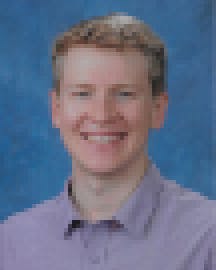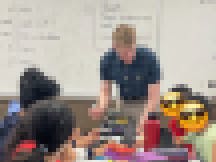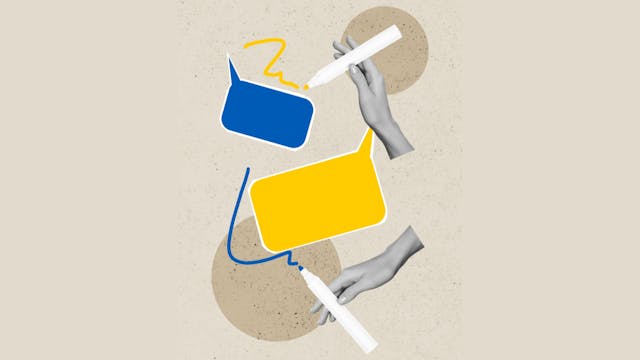When he was in high school, Zachary Farley latched onto the idea of becoming a teacher.
Then in college, when he started learning Mandarin, a deep love of languages took hold, and he began to make new plans.
After graduating, Farley entered a program to become a speech-language pathologist. This path seemed like the best way to blend his love of linguistics with his interest in teaching — that is, until he took a job as a paraprofessional at an elementary school in his hometown of Corona, California.
It began as a way to earn money and acquire relevant experience for a career in speech pathology. But Farley, who had been learning Mandarin for a few years by then, was serving a class of kindergarteners enrolled in a Mandarin-English dual immersion program. That’s when everything fell into place.
“It ended up leading to this perfect point,” shares Farley. He had a front-row seat to a career that would allow him to pursue his two greatest passions: language and learning.
With some encouragement from his peers and mentors, Farley shifted gears one more time.
He enrolled in a master’s program at Claremont Graduate University (CGU) to pursue a multi-subject teaching credential. CGU has a teacher residency program that let him stay in the elementary school he was already in. As he puts it, “One day, I was working there as a paraeducator, and the next day I was student teaching in sixth grade.”
Farley’s own journey as an adult language learner has positioned him to be relatable and empathetic toward his students, he says, and to show them that learning is lifelong.
In our Future Teachers series, we highlight individuals enrolled in teacher preparation programs today, to understand what attracted them to the education field in the first place, what inspires them, what worries them and why they remain undeterred. In this installment, we are featuring Zachary Farley.
The following interview has been lightly edited and condensed for clarity.

Name: Zachary Farley
Age: 22
Current town: Corona, California
College: Claremont Graduate University
Intends to teach: Elementary education, ideally in a Mandarin-English dual immersion program
Hometown: Corona, California
EdSurge: What is your earliest memory of a teacher?
Zachary Farley: The earliest memory I have of a teacher was in first grade. I remember doing a lot of reading in that class. I think that class got me into reading for pleasure and also reading for education. I remember doing a lot of storytelling and drawing illustrations along the way. I remember that class very clearly, and I think it was really fundamental for me.
When did you realize that you wanted to become a teacher yourself?
It was a very long process. For many years, I didn't really have any interest in being a teacher. My mom is an elementary teacher, and she has been for more than 30 years now. It wasn't until high school that I seriously considered teaching as a career. It was in my junior year, when my AP English language arts teacher said that I would potentially be a good teacher for a subject like that.
I intended to complete my undergraduate degree, do a master's program for education and then start teaching. But then I decided that I wanted to take my English and linguistics degrees, which I earned from the University of California, Santa Barbara, and go into speech-language pathology instead.
After graduating, I enrolled in a post-baccalaureate program to prepare for my speech-language pathology master's program. I completed one year of that program but then something happened and I had another change of heart.
During my post-baccalaureate program, I was working as a paraeducator at Philistine Rondo School of Discovery, a public elementary school here (in Corona, California). I was a paraeducator for a kindergarten class in the Mandarin-English dual immersion program, and I was working in that program because I speak Mandarin. As a paraeducator who speaks both languages, I was a good fit for the program. The teacher that I worked with, as well as the coordinator for the program in the district, would both occasionally say, ‘Oh, you'd be a really great teacher,’ or ‘Oh, we'd love to have you in the program.’
I made the difficult decision to leave my post-baccalaureate program and enroll in the master's education program at Claremont Graduate University. I am really grateful to the teacher that I worked with, my principal, and everyone else at Rondo who came together at the last minute to rally behind me as I made the transition.
So that was my journey. That was my path. I went back and forth quite a bit.

Tell me about the teacher preparation program you're in. What has your experience been like so far?
I began the one-year Claremont program in July 2023 and began student teaching at Rondo the next month. It was a very quick transition. One day, I was working there as a paraeducator, and the next day I was student teaching in sixth grade.
With CGU, there is a residency program where you remain in the same classroom for the entire school year. I am in a sixth grade class for the entire year. I'm also doing an internship, which is through a new partnership between CGU and Corona Norco Unified School District (which Rondo is part of).
For the first half of my school day, I'm in the classroom doing typical student teacher duties. Then, halfway through the day, I take on my internship role as a literacy interventionist. During that time, I work with the literacy intervention teacher, and I conduct 30-minute literacy intervention sessions with groups of five or six students.
It's a very unique experience because not only do I get a full year in a classroom, but I also spend all of this additional time working with first through sixth graders to help them improve their literacy.

How exciting to have so much field time. You must be pretty busy though. Do you have online coursework? Night classes? How does that work?
My program is completely online. Typically, classes are on Tuesdays and Thursdays from roughly 5 to 8 p.m. It's a pretty intensive course load. The amount of units isn't particularly staggering — it's usually somewhere between eight to 12 semester units — but with the amount of hours that's necessary, especially given that I'm doing the internship on top of the residency, it is pretty busy, yes.
The dual immersion program at your school sounds pretty special. Can you tell me more about it?
Yes, it is. The program, which started four years ago, runs from kindergarten through third grade. Many students in the program are native Mandarin speakers that have little to no English exposure. There are also some students who are native English speakers that have little to no Mandarin exposure. And then there is a mix where maybe one parent in the home speaks Mandarin and the other parent speaks English. So it's a broad spectrum of children who have varied exposure to both languages.
The goal is that by the end of the program — at Rondo, we are K-6 — students are bilingual and biliterate. So they can read, write and speak in both English and Mandarin.
Each grade level has a Mandarin teacher and an English teacher. And it varies by grade, but for kindergarten, for example, on Monday, maybe one group is with the English team, and another group is with the Mandarin team. Then on Tuesday they switch. So they're continuing the content learning, going back and forth between teachers each day so they can get exposure to both languages. And they're not just learning each language, they're also learning in each language. So for example, they're learning math in Mandarin or they're learning science in English.
Why do you want to become a teacher?
I want to be a teacher for a few reasons. I really want to help students have a strong foundation for their learning. That was always my intention with speech-language pathology — to have a pivotal role in building a strong foundation. And I think that that's why I want to be a teacher now.
One of the reasons I specifically want to work with a Mandarin-English dual immersion program is because I understand, as an adult, what it's like to be a language learner. I was not a language learner when I was younger. I'm a native English speaker, so I didn't go through the same struggles that some of the children I serve do. But as an adult, starting from scratch learning Mandarin, I get it. It's hard to learn a language.
Last year, every day, I would be telling kids, ‘It's OK, I don't know how to say this word either,’ or, ‘I am learning along with you,’ or ‘I understand that it's hard.’ I can empathize with them. My students who are native Mandarin speakers see that and say, ‘OK, Mr. Farley is learning my language, so if he can do that, then maybe I can learn English.’ My students who are native English speakers see me and they think, ‘Oh, Mandarin's really hard to learn and I'm having trouble, but Mr. Farley's learning along with me.’
That is why, no matter which school site I end up in, I really hope to be in a program like this, where students can see themselves in what I'm doing. I can always tell these students that I am learning along with them.
What gives you hope about your future career?
In the field of education, there’s a goal of constant improvement and being better — that’s how I feel, and it’s what I see in my fellow teacher candidates in my program. There are some really passionate people in this field already and many others going into the field, despite the challenges.
What worries you about becoming a teacher?
One thing that does give me pause is how prevalent students' use of technology is outside of the classroom and in contexts that are not educational. I see how it's affecting them emotionally and developmentally. I see shorter attention spans, inappropriate jokes and comments that they don't understand, exposure to things that are not age appropriate (through YouTube, for example).
My concern is that if they’re always on iPads or playing video games at home, it could come to a point where I'm competing with their iPad to see who can give them the biggest dopamine rush. That gives me a lot of pause. I think about that pretty often.
And it’s true for adults, too. Many adults are addicted to their cell phones. I mean, I sit there scrolling sometimes without thinking about it, and then I think of what it’s like for a 7-year-old and I'm like, man. That's hard for me to grapple with. How am I going to compete with that?
Why does the field need you right now?
As part of the interview for the CGU program, we are assigned a text to read, and then in the interview we discuss it. The text I was assigned is from Crystal Laura, and she talks about how in education, you want to try to be “a cool drink of water in hell” for students who are experiencing difficult circumstances, in the classroom, at home or for any reason. It could be because they're an English learner and they are just stuck, or they're lost, or they're not getting the right support.
That idea from Laura is something that motivates me to work with English learners — the idea of being a resource or relief to someone who needs it. That's kind of guided me.


